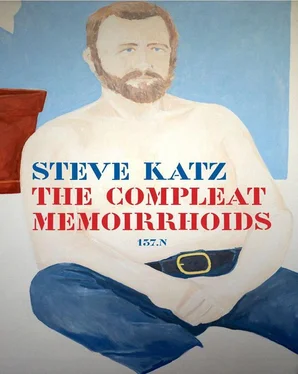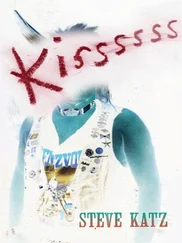We enter a polished marble room of cubicles, a man in each, throwing water over himself from a bucket. My man sits my body on a stool in one of the cubicles, balancing me so I don’t tip over. He leaves me there for a moment, and I fear I am abandoned. I can’t move on my own. He does come back with what looks like a huge shaving mug full of suds. I feel very small. He slaps and swabs my body with a large mop he pulls from the suds. Then he uses a cloth whose coarseness is almost bladelike. He scrapes my skin, pulling down scrolls of dead surface. He clicks his tongue, and points at the accumulation, looking as if he’d got to me just in time. He pours several buckets of warm water over me to wash the crud away. Then he dries me off, wraps me in a bathrobe, and lifts me again like a baby. If I were asked to, I couldn’t walk on my own. I’ll never walk, not again, not the same way.
I recognize the entrance hall. The desk clerk smiles at us, nodding. My man carries me up some stairs I didn’t see when I came in, and opens up a small windowed compartment where he lays me out on a cot. A young man follows, with a tray holding a cup of sweet tea, and a nargilah. ‘Hammam’, says my man with finality, and he leaves. An older man arrives and packs the pipe with tobacco, picks some coals out of a small brazier, and lays them on top of the golden leaf. I am lying here in the fragrances — ambergris, myrrh, cardamom. I will never move again. I have a dreadful thought that soon I will have to grapple with the street again. These vestiges of Ottoman indulgence have taken me prisoner. The tea is sweet. I bubble some smoke through the pipe and let its acrid, meaty needles penetrate my mouth. I lie back. “Hammam,” I whisper. I am here, probably forever. “Hammam. Hammam.”
Rudy calls to tell me about it, and Leo’s suicide registers. Do I care? Let’s see, the last time I saw him was at the preliminary screening of Grassland , which we wrote together. I drag my memories of Leo into the emotional car wash; but shiny as that old wagon gets, I don’t feel like driving it again. Then Wendy Apple calls with the same news and my reaction is more extreme, as if a tank has pulled up on the lawn and its turret turns to point the cannon at my heart. Maybe that’s overdone. My heart has nothing to do with it. Remember! Something insists. Remember what? Leo Garen? My brief Hollywood interlude? Suicide! I never knew Leo in his manifestation as a fanatical sailor, as a Marina del Rey bon vivant. From what I’d heard he continued to be obnoxious, abrasive, self-centered, selfish, endlessly curious, totally oblivious, demanding, generous. Wendy, who had also worked on Grassland , never got away from Leo because she lives near the Marina, where he spent many years surviving on his boat. He had once mentioned to me that sailing was a kind of salvation for him. Wendy tells me about the difficulties his friends had retrieving his ashes from Cartagena, in Colombia, where police were investigating his death as a murder. He had crewed on a boat, with one other person, sailing from LA to Cartagena. When they were caught in a hurricane, the captain almost murdered him. He jumped ship in Cartagena. Leo loved that city, according to John Nichols’s effusive obituary tribute in the Taos Horse Fly . He wrote to Nichols, “The women are downright gorgeous. I’ve never been anywhere with such a high percentage of staggering beauties.” According to John Nichols he planned to marry one. After that failed, lacking money to return to the US, stripped of viable options at seventy, he took a room in a cheap hotel, asked not to be disturbed, and swallowed all the pills. His friends dumped his grey remains into the ocean at Marina Del Rey, the orphan finally surrendered to mother Pacific.
So Leo checks himself out. This exclamation point resurrects a dimmed though once exasperating episode in my life. Although I’d hardly thought about Leo in the thirty plus years since we worked together, suicide put him right up on my big screen. When a friend passes naturally, it leaves its melancholy mark, notes of sadness and regret; but suicide is such a powerful dissonance, its shock rattles you to attention. It’s a heavy choice. It reminds you that you can steer the ship. I agree with John Nichols, that I would never have expected Leo to suicide. He was a survivor. Perhaps for him suicide is another survival tactic. It puts him back on our screens, reminds all of us that he directs the show.
I get first class tickets. When you travel hard sometimes you need first class to battle exhaustion. This is for the train from Puno on Lake Titicaca to Arequipa near sea level, the highest stretch of railroad in the world. It starts at the highest navigable lake in the world, at 12,500 feet, crosses the altiplano, and goes over mountain passes, and then down into the White City. The ride is cold, scarce of oxygen. It doesn’t make much difference to my son, but I need comfort and warmth. We look forward to a restful, hassle free ride. The car we enter is marked first class, but that makes little difference. Everyone sits anywhere. A first class ticket seems to give you the privilege to pay a bigger price, nothing else. We’d had a weird and stressful day in the tourism groove on Titicaca. Before that we endured a long, tiring bus ride from La Paz to Puno, with a cadre of Mormon missionaries, dressed in suits and ties, leaving after two years on the altiplano. They had worked with Aymala Indians to create a written language, so they could translate The Book of Mormon . “We learned more from them than they did from us,” one of them admitted with surprising candor. I want nothing more than a quiet ride to a new city. Avrum is already asleep on the seat next to me. An Aymala family squeezes into the facing seats, man, wife, three kids. They certainly aren’t holding first class tickets.
I put my camera on the seat and stand up to look around for a conductor, someone to whom I can appeal our first class status in this second-class situation. My inner huffiness is aroused. I don’t need a crowded ride on this overnight train.
The tall, handsome Hispanic gentleman who enters the car, throws his overcoat onto the seat as if to claim it. He is neatly coiffed and dressed impeccably as a Mormon in a dark blue serge suit, white shirt with black knit tie, Adidas sneakers. I explain to him that the seat is mine; in fact, I tell him I have a first class ticket and roll my eyes, believing he’ll sympathize. He apologizes politely, and gathers his coat to hand it out the window to an equally well-dressed Hispanic woman, in a dark red sweater, and flared grey skirt, also wearing Adidas running shoes. She grabs the coat, and my Olympus slips out of it, onto Avrum’s lap. It doesn’t wake him. The father of the family across from us has his fist wrapped around the strap. He has the slightest grin on his face, and exchanges a glare with the gentleman in sneakers. He knows the scam, and foiling it gives him some satisfaction. How can I thank him? That is my trusty Olympus. I used it to shoot the photos for my book, Moving Parts . Avrum is awake. I give him some money to run out and buy some oranges, oranges because of the thing that happened earlier that day on Titicaca. The family suddenly looks beautiful, their smiles wide and open as the whole altiplano. A depth of humor, innocence, wisdom dwells in their dark eyes, vast as these continents before the Europeans parceled out the land among themselves.
At first they refuse the offer of oranges, but finally take them. The father speaks a little English. As the train moves into higher altitudes he explains that the Europeans accuse the natives of thievery, but they themselves are the thieves, and it started when they first stole all the land.
Читать дальше












